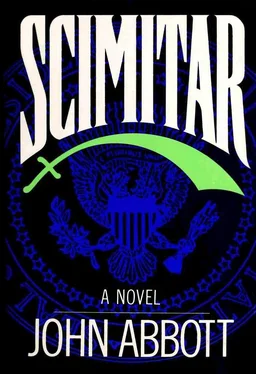Sonny raised his brows appreciatively.
“I hardly ever see him anymore,” Elita said, somewhat wistfully.
“You must have done a lot of traveling around,” he said.
“Oh, yes. Well, an Army brat, you know. By the way, I’m not really fifteen.”
“You’re not?” he said, feigning surprise. “I thought you were. Your name’s Lolita, so I thought...”
“No, it’s El ita. E-L–I-T... you’re putting me on again, right?”
“How old are you really , Elita?”
“Nineteen. How old are you really?”
Please don’t say thirty, she thought.
“Twenty-nine,” he said.
She felt enormously relieved. Twenty-nine wasn’t quite thirty. But try to sell that to her mother. Mom? Hi, I just met this gorgeous guy on the train, I think I’m in love with him, he’s twenty-nine years old. Mom? Take your head out of the oven, Mom.
“What’s funny?” he asked, and she realized she was smiling.
“My mother,” she said.
“What about her?”
“Are you Mexican?” she asked.
“Why? Is your mother Mexican?”
“No, but are you?”
“Do I look Mexican?”
“Sort of.”
“My complexion?”
“I don’t know what. This... sort of exotic look you have.”
“Oh my,” he said, “exotic,” and waggled his eyebrows like Groucho Marx.
“Are you?”
“No, I’m part Indian and part British,” he said.
She wondered if that was better. Hello, Mom? He isn’t Mexican, you can climb down off the windowsill. He’s British, Mom. Well, part Indian, I guess.
“ Indian Indian, right?” she said.
“Yes,” he said.
Which is really a whole lot better than Comanche or Chippewa, Mom. Wait’ll you see him, he looks like a young Dr. Zhivago, whatever that actor’s name was. Only better looking.
“What part of India are you from?” she asked.
Careful, he thought.
“A little town called Jaisalmer,” he said.
“Where’s that?”
“Close to the Pakistan border. Have you ever been to India?”
“No. But my dad was stationed near there when I was twelve.”
“Oh? Where?”
“Burma,” she said.
He signaled to the waiter. Everything he did, his every motion, seemed smooth and accomplished. He made something as simple as signaling to the waiter seem like a liquid hand gesture in a ballet. Careful, she told herself, this can get complicated.
“Who’s Lolita?” she asked.
“A little girl who fell in with a dirty old man,” he said.
“Oh my,” she said, and rolled her eyes.
“Yes,” he said.
“And did she come to a sorry end?”
“Yes, sir,” the waiter said, “are you ready to place your order?”
“Elita?”
“I’ll have the eggs, over medium, please, with bacon.”
“Orange juice? Coffee?”
“A small orange juice. Do you have decaf?”
“Fresh brewed.”
“I’ll have a cup, please.”
“Sir?”
“Same as the lady,” Sonny said. “All the way down the line.”
“Yes, sir, thank you, sir,” the waiter said, and walked off grinning.
“Tell me more about Lolita,” she said.
The call from London came just as The Eagle was approaching Texas. The train had by then come through Arizona and almost all of New Mexico, and was on the outskirts of El Paso. On the train, it was still three-thirty in the afternoon, Mountain Time. In New York City, it was five-thirty on a hot summer evening.
When the telephone rang, Geoffrey was just about to hit the four-number combination that would unlock the inner door to what the consulate personnel called “the airlock.” The security measure had been installed in 1984, several weeks after Libyan terrorists killed a policewoman in London. The airlock consisted of a pair of steel doors flanking an empty cubicle. One door led to the inner offices. The other door led to the waiting room. Each door had a different combination lock on it. You opened one door, locked it behind you, and then opened the second door. The airlock had been designed to dissuade entry by anyone intending mischief. Geoffrey had already pressed the first number of the combination when Peggy Armstrong, one of the vice consuls in Passports and Visas, called in her high, shrill voice, “Geoff, for you! It’s the Mainland!”
He wondered whether hitting the first number of the combination and then leaving it at that would cause alarms to go off and security people to descend upon him in hordes. Nothing on the alarm panel indicated what one should do in order to abort. He waited, fully expecting total disaster. Nothing happened.
“Geoff!”
Peggy’s voice again.
“The Main land!”
Why she insisted on calling Britain “the Mainland” was totally beyond him. He sometimes suspected that Peggy had descended from another planet and was only now coming to grips with living on earth. She did somewhat resemble an alien being, what with frizzed red hair sticking out all over her head, and enormous brown eyes magnified by equally enormous goggles. A totally bug-eyed, flat-chested wonder, standing beside his desk now in tweeds better suited to the moors than to the Three H’s of a summer in New York, telephone receiver in her hand, thoroughly exasperated look on her homely face.
“Thank you,” he said coolly, taking the phone and hoping his tone of voice conveyed the annoyance he’d felt at being yelled down like a fishmonger.
“Turner speaking,” he said as Peggy marched off in a huff, presumably to her waiting spaceship.
“Geoffrey, ho, it’s Miles Heatherton here.”
Heatherton worked in the Consular Department of London’s Foreign Office, in a street near St. James’s Park called Petty France. Geoffrey had telephoned him earlier today, immediately after the Twentieth Precinct biked over the passport they’d found in the murdered woman’s handbag. He’d given Heatherton the number on the passport, the woman’s full name — Gillian Holmes, as in Sherlock — and the date and place of issue, in this instance June of last year in London. All routine. As required, the woman had listed in her passport the names, addresses, and telephone numbers of two persons to be notified in the event of an emergency. One was a brother named Reginald Holmes, who lived in London. The other was a friend named Jocelyn Bradshaw, who lived thirty-six miles west of London, in Henley-on-Thames.
“Sorry to be getting back to you so late on this,” Heatherton said, “but we ran into a bit of a problem.”
“What do you mean?” Geoffrey asked.
He could not imagine anything so urgent that it could not have waited till morning. This was a routine notification of next of kin, and it was now past ten-thirty in London.
“Well,” Heatherton said, “we tried the numbers you gave us for these people — the one in London, and the other in Henley — and we got two other people entirely.”
“I’m sorry,” Geoffrey said, “I’m not following you.”
“There’s no Reginald Holmes at the London number, and no Jocelyn Bradshaw at the Henley number.”
“Moved, have they?”
“Well... no, it doesn’t appear so. The people who answered the telephones said they’ve lived at those addresses for the past ten — well, ten years in the case of the London man, seven for the one in Henley.”
“Uh-huh,” Geoffrey said. He hadn’t the foggiest notion where Miles was leading.
“Which I thought decidedly peculiar in that these are the identical addresses listed in the passport,” Heatherton said.
“Are you saying the addresses and phone numbers in Miss Holmes’s passport do, in fact, exist, but the people she’s listed as brother and friend do not live at those addresses?”
Читать дальше












